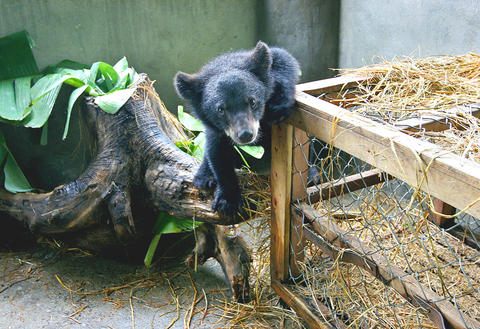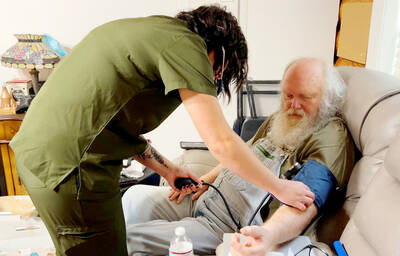When they were smuggled across the Lao-Vietnamese border in tiny cages, three wild bear cubs were destined for a life of painful misery in the illegal but flourishing East Asian bear bile trade.
Today they are the first inhabitants of a bear rescue center in northern Vietnam, a facility that organizers hope will help change public attitudes toward what they call a cruel and unnecessary trade.
The Animals Asia Foundation (AAF) sanctuary now taking shape is set to house an initial 200 animals on the edge of a national park north of Hanoi, where bears freed from captivity will be rehabilitated in a mountain forest setting.

PHOTO: AFP
Like thousands of other bears in Vietnam and China, the three cubs - named Mara, Mausi and Olly by their new minders - were caught in the wild to be tapped for bile, a substance produced by their gall bladders that is used in Asian traditional medicine.
Called mat gau in Vietnamese, bear bile is sold in the region as a health tonic, an anti-inflammatory, a cure for liver and heart ailments, an aphrodisiac, and even as an additive in shampoo, toothpaste and soft drinks.
The trade, along with habitat destruction, has driven Asiatic black bears, also known as moon bears, to the edge of extinction here, forcing poachers to travel deeper into the forests of neighboring Laos and Cambodia.
The three playful cubs at the AAF center were confiscated in May from cages smuggled on a bus across the Lao-Vietnam border after a tourist contacted an environmentalist group, which alerted the authorities.
"They were tiny, about 2kg each, and completely undernourished," said veterinary nurse Candice Bloom. "They had diarrhea, they were very ill and we think they had parasites as well. They were very scared and frightened."
The Hong Kong-based foundation - which has set up a similar rescue center in Chengdu, China - says it hopes to gather hundreds, and eventually thousands, of the animals, pending government approval to expand its facility.
In the park's initial phase, workers are now building two houses with 24 holding dens, veterinary facilities, nurses' quarters and food storage areas in a picturesque valley on the edge of Tam Dao national park.
Under the blueprint, subject to final state approval, the facility would be expanded across a broader area to resemble an adventure playground for bears, with water pools, climbing structures and a public viewing area.
Vietnam has outlawed bear farms, but at least 4,000 of the animals remain trapped in cages across the country, in part because so far there is no place to put confiscated animals, said AAF Vietnam director Tuan Bendixsen.
"We are building this rescue center so the government can enforce the law, and to use it as a focal point to educate the public," he said. "Hopefully we can change public attitudes and rescue more bears."
The extraction of bear bile is painful and dangerous, said Bendixsen.
"In China they use the 'free drip method' where they just cut a hole in the stomach and let it drip out," he said.
"In Vietnam they knock the bear out with drugs, but not fully. They pull the bear out of the cage and tie it down, use ultrasound machines to find the gall bladder and use a long needle to pump the bile out.
"The needles are not sterile. This causes massive tissue damage and infections. Bears get cancers and nasty diseases. Some animals also lose their paws in traps, some in bear paw soup or in rice wine."
Veterinarian Bloom said experience in China had shown that "some of the bears are completely traumatized, banging on their cages. It's quite a horrible experience. Some bears take years to recover."
AAF admits that its rescue center for 200 bears is a drop in the ocean, with 4,000 bears still in captivity, but Bendixsen said the foundation would be willing to scale up its operation if it gets the green light from Vietnam.
"If the government were going to shut down all the bear farms tomorrow, we could look at a semi-enclosed area, like a safari park, where we could do basic feeding," he said. "We are willing to work with the government, and this is a first step toward ending bear farming once and for all."

Oct. 27 to Nov. 2 Over a breakfast of soymilk and fried dough costing less than NT$400, seven officials and engineers agreed on a NT$400 million plan — unaware that it would mark the beginning of Taiwan’s semiconductor empire. It was a cold February morning in 1974. Gathered at the unassuming shop were Economics minister Sun Yun-hsuan (孫運璿), director-general of Transportation and Communications Kao Yu-shu (高玉樹), Industrial Technology Research Institute (ITRI) president Wang Chao-chen (王兆振), Telecommunications Laboratories director Kang Pao-huang (康寶煌), Executive Yuan secretary-general Fei Hua (費驊), director-general of Telecommunications Fang Hsien-chi (方賢齊) and Radio Corporation of America (RCA) Laboratories director Pan
The consensus on the Chinese Nationalist Party (KMT) chair race is that Cheng Li-wun (鄭麗文) ran a populist, ideological back-to-basics campaign and soundly defeated former Taipei mayor Hau Lung-bin (郝龍斌), the candidate backed by the big institutional players. Cheng tapped into a wave of popular enthusiasm within the KMT, while the institutional players’ get-out-the-vote abilities fell flat, suggesting their power has weakened significantly. Yet, a closer look at the race paints a more complicated picture, raising questions about some analysts’ conclusions, including my own. TURNOUT Here is a surprising statistic: Turnout was 130,678, or 39.46 percent of the 331,145 eligible party

The classic warmth of a good old-fashioned izakaya beckons you in, all cozy nooks and dark wood finishes, as tables order a third round and waiters sling tapas-sized bites and assorted — sometimes unidentifiable — skewered meats. But there’s a romantic hush about this Ximending (西門町) hotspot, with cocktails savored, plating elegant and never rushed and daters and diners lit by candlelight and chandelier. Each chair is mismatched and the assorted tables appear to be the fanciest picks from a nearby flea market. A naked sewing mannequin stands in a dimly lit corner, adorned with antique mirrors and draped foliage

The older you get, and the more obsessed with your health, the more it feels as if life comes down to numbers: how many more years you can expect; your lean body mass; your percentage of visceral fat; how dense your bones are; how many kilos you can squat; how long you can deadhang; how often you still do it; your levels of LDL and HDL cholesterol; your resting heart rate; your overnight blood oxygen level; how quickly you can run; how many steps you do in a day; how many hours you sleep; how fast you are shrinking; how